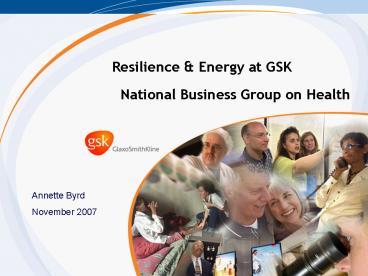Resilience - PowerPoint PPT Presentation
1 / 27
Title: Resilience
1
Resilience Energy at GSK National Business
Group on Health
Annette Byrd November 2007
2
(No Transcript)
3
(No Transcript)
4
(No Transcript)
5
(No Transcript)
6
(No Transcript)
7
Overview of Today
- WHY Issues to which GSK was responding
- HOW Fitting into the GSK health framework
- WHAT Energy and Resilience Products
- WHO Leaders/Individuals/Teams
- HOW MUCH Data
- Where Global profile
8
WHY Business Realities
- Health care costs
- Culture
- Competitive global market
- Accelerating change
- Different business model
- Compliance
9
WHY Business Realities
- Committed to win
- Competitive global market
- Accelerating change
- Different business model
- Compliance
10
HOW DOES IT FIT The GSK
Framework for Health
- Prevention
- People
- Productivity
- Culture
11
WHAT Is Resilience
- The ability to be successful, personally and
professionally, in a highly- pressured,
fast-paced and continuously changing environment.
12
WHAT Resilience Products
Creativity
Leading Resilience
Team Resilience
Personal Resilience
13
WHAT Focus on the Leader
ENERGY 4 PERFROMANCE
Energy Management
Identity
Values Beliefs
Behaviours Capabilities
14
WHAT Focus on the Individual
PeERSOANL RESILIENCE
Energy Management
Identity
Values Beliefs
Behaviours Capabilities
15
WHAT Focus on the Workstream
TEAM RESILIENCE
TEAM EFFECTIVEMESS
Continuous Improvement
16
HOW MUCH Overall Survey Summary
3/17
The chart shows the number of employees in each
of the categories for the seven sources of
pressure scales.
Team results
GSK benchmark
3036
Relationships
625
5455
2892
2849
3624
Work Demands
861
4674
4332
1800
Culture
1254
4622
4069
2118
Career and Development
2800
3021
2229
4947
Control
1136
3696
2721
4362
1628
Management Practices
3297
2840
5982
405
Individual Characteristics
2781
100
low pressure
0
10
20
30
40
50
60
70
80
90
moderate pressure
high pressure
n 12008
17
HOW MUCH Main sources of pressure
- Work demands
- Recognition Career
- Change
18
HOW MUCH Work Demands
5/17
n 12008
19
HOW MUCH What does the survey measure?
- Reliable Scales within the Survey
- Commitment/Engagement
- Work-Life Integration
- Workload and Pressure
- Satisfaction with Relationships at Work
- Flexibility and Control
20
HOW MUCH Work Home Balance
14/17
The following charts show how well the
respondents are able to manage the balance
between their work and home/personal life.
I effectively manage the demands of work,
personal and family life
I can spend the time I want on things that are
important to me
I have the flexibility I need to meet my work,
personal and family commitments
n 12008
21
HOW MUCH The Effects of Pressure
17/17
n 12008
22
HOW MUCH Segmemtation of Results
Good Work/Life Balance Health
The Engaged and Balanced (22) High enjoyment,
high pride, good Work-Life Balance
6
The Comfortable (29) Good enjoyment and WLB,
weaker sense of contribution
5
4
3
4
5
6
3
2
1
4
High Job Satisfaction High Enjoyment
Low job satisfaction High Intention to leave
2
1
3
The Prone to Leave (22) Low enjoyment, poor
WLB
The Engaged yet Unbalanced (27) High feeling
of contribution, good enjoyment, poorer WLB
2
1
High pressure sense of contribution
23
HOW MUCH What we need to do?
Good Work/Life Balance Health
- BOOST THEIR EMOTIONAL PERSONAL ENERGY
- Explain how their job contributes to GSK, fits
in the big picture - Enrich jobs, challenge, promote if they desire
it leave it as it is otherwise, to avoid fall
into group 1 - Target populations RD WITH GRADE D OR E
- YOUNG, WOMEN
6
The Engaged and Balanced
5
4
3
4
5
6
3
2
1
4
High Job Satisfaction High Enjoyment
Low job satisfaction High Intention to leave
2
3
- ENSURE SUSTAINABILITY OF THEIR
- EMOTIONAL PHYSICAL ENERGY
- Monitor health and well-being
- Make them aware of the long-term benefits of
remaining energized and healthy - Offer personal resilience training to reduce
pressure - Target populations EXECUTIVES, SALES, MIDDLE
MANAGERS 35-44 OLD, MEN, CONSUMER HEALTH
2
1
High pressure sense of contribution
24
HOW MUCH Overall Workforce Changes
- Changes over a two-year period (2004-2006)
- willingness to experiment with new work practices
is up 14 - satisfaction with the company increased 21
- work-related mental ill health fell by 60 and
- pressure due to work/life conflicts is down 25.
25
WHERE Active Teams
26
WHERE Trained Facilitators
27
(No Transcript)




























![READ⚡[PDF]✔ Prepared Neighborhoods: Creating Resilience One Street at a Time PowerPoint PPT Presentation](https://s3.amazonaws.com/images.powershow.com/10051374.th0.jpg?_=20240609107)
![❤[READ]❤ Resilience on Parade: Short Stories of Suffragists & Women’s Battle for the Vote PowerPoint PPT Presentation](https://s3.amazonaws.com/images.powershow.com/10051382.th0.jpg?_=20240609109)

